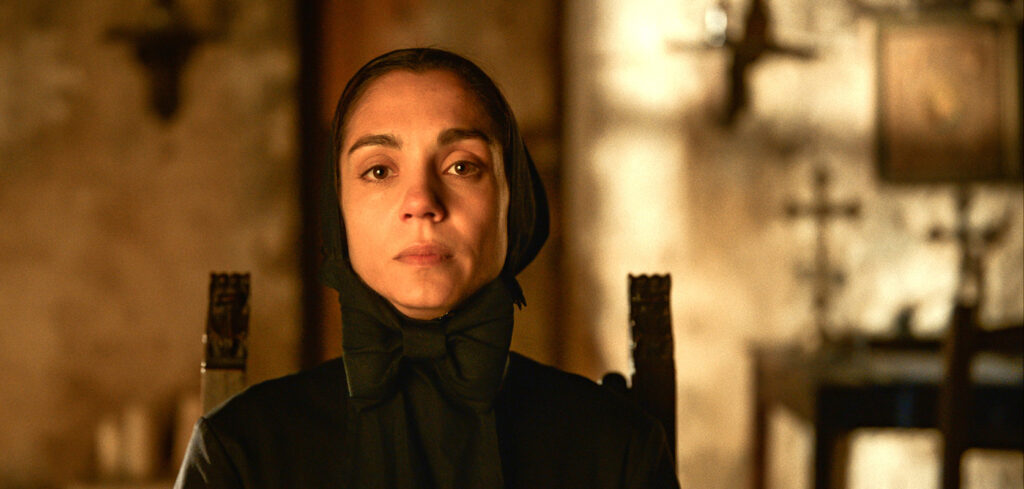
Cabrini, the movie and radical goodness.
Saint Francesca Cabrini was a force of nature. The actress portraying the first American saint, Francesca Dell ‘Anna makes Cabrini, the movie, a tour de force. Rarely does a film make use of all of its potential. In this one, however, the acting, screenplay and cinematography in Cabrini achieve near-perfection. Although I knew next to nothing about Saint Francesca Cabrini, the fact that it was written and produced by Sound of Freedom writer and director Alejandro Monteverde, along with this riveting face on the trailer, served as compulsion to see it on opening day.
Most of the film takes place in late 1880’s New York, recently flooded by two million Italian immigrants. Cabrini’s persistent requests to begin a new missionary order is finally granted by Pope Leo Xll. But not in China where the determined nun wishes to go but to Five Points, New York.
“What place is this, to which the squalid street conducts us? A kind of square of leprous houses, some of which are attainable only by crazy wooden stairs without. What lies behind this tottering flight of steps? Let us go on again, and plunge into the Five Points. This is the place; these narrow ways diverging to the right and left, and reeking everywhere with dirt and filth.
Charles Dickens
The face in the photo above belongs to Cristiana Dell’ Anna. The power of her performance makes Rod Barr’s sparse dialogue almost afterthought. Asked what she learned from her portrayal of Cabrini, Dell’ Anna’s reply is unsurprising. “There’s a part of me that I leave behind, that I lose into the character. I don’t know where it goes, but there’s a bit of me that gets lost somewhere, and that person becomes real. When I see the movie, I feel like that person now exists other than me. It wasn’t something that I did. It’s something that exists, and if I could, I would call them up and ask them, “How are you doing?”
Indeed the character I was introduced to last week in Cabrini the movie, is real: she taught me about sanctity.
Sanctity isn’t about being extraordinary
…If only with the light God gives me, I could make all souls desirous of sanctity see this, but they become discouraged because they think that sanctity is very difficult to attain. How little God asks of the soul that is disposed to seek it without fear!…But how to disabuse souls of the idea that something extraordinary is required to become saints? To convince them, I would like to erase everything extraordinary in the lives of saints, confident in so doing I would not take away their sanctity, since it was not the extraordinary that sanctified them but the practice of virtue we can all attain with the help and grace of the Lord…how many souls never reach sanctity because they do not proceed on the path they were called by God…
Venerable Mary Magdalen of Jesus in the Eucharist, CP
We never hear Cabrini’s feelings about the continual rejections or the mountainous obstacles to achieving her goal. She doesn’t have the breath for them. As I reflect on this film, the countless reasons that it stays with me, thoughts of sanctity cannot help but bubble up in my mind. Rather than being intimidated by this true force of nature Cabrini and the immensity of her accomplishments, it’s God I see in her. And, perversely, in me.
What she achieved and how were impossible.
And yet she did them.
Cabrini personifies not just the theological virtues of faith, hope and love. But also patience, persistence, hope- the combative hope that Pope Francis exhorts us to pray for.
Radical goodness
All of which brings me to this astounding phrase, radical goodness. Rabbi and messianic Jew Jonathan Cahn recently published The Josiah Manifesto-The Ancient Mystery and Guide for the End Times. Like each of its predecessors, this one fuses the God of ancient Israel with current events and politics. I read it in one sitting.
Cahn’s writing of the consequences of America’s embrace of abortion to our nation and each one of us is categorical. Revealing the Biblical demonic entities behind rights-talk,, the reader is introduced to those ancient Babylonian and Canaanite gods who demanded the blood of babies and children. And who are alive and prospering in our twenty-first century. Cahn’s data correlating the pandemic of Covid 19 with Covid deaths in New York City, the epicenter of abortion, are jaw-dropping.
It isn’t a fun read and the content may stretch one’s credulity. But his phrase, “radical goodness” has engraved itself into my heart and mind. In the last few chapters of the book, Cahn addresses the remnant: those God-fearing Americans who see the satanic underpinnings of “progressive ideology.” Regardless of religious affiliations, Cahn addresses each one of us with his rallying cry of radical goodness. We’re here, Cahn writes, at the “appointed time.”
Despite the conflict and confusion everywhere we look, we have the weaponry given us by Christ:
- Prayer
- Fasting
- And almsgiving.
- Done more ferociously than ever before and
- A scrupulous obedience to God’s law that looks foolish to everyone, except the remnant.
“Through prayer, the soul unites with God and attracts His grace; through fasting, and in general through penance, the flesh is subjected to the spirit and the soul becomes more disposed to receive divine favors.” As the prophet Joel proclaimed, “Sanctify a fast, call a solemn assembly, gather the people, sanctify the congregation, assemble the elders, gather the children” (Joel 1:14). Don Dolindo continues his advice by saying that “prayer increases faith, fasting increases self-control and holy humility”, as Scripture says “the sacrifice pleasing to God is a broken spirit” (Psalm 51:17). Elie G. Dib




Another great article!
Blessings, Michael ????
Hi there my friend-
Thanks for the message and hope you and family are having a blessed Lent!